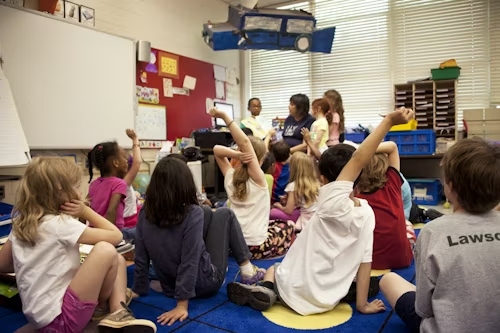Accredited Online High School Programs: Why Choose Them?
Accredited online high school programs are preferred by students for their flexibility, quality education, and the opportunity to learn at their own pace.
Understanding Teacher Personality: Why It Matters in Online Learning

In every classroom—physical or virtual—the teacher’s presence shapes the learning experience. While qualifications, curriculum, and teaching strategies are essential, the teacher’s personality often plays the biggest role in how students engage, learn, and grow. At Forest Trail Academy, our flexible, self-paced K–12 online programs are designed to accommodate different learning styles, but what truly sets us apart is the quality and character of our educators. Whether you’re in kindergarten, elementary school, middle school, or online high school, the influence of the teacher remains central. In this post, we’ll explore why teacher personality matters, what defines great teacher traits, the different types of teachers’ personality, and how they impact student success—especially in an online learning environment. Why Teacher Personality Is Important in K–12 Education A teacher’s personality is more than just charisma or energy—it’s the combination of values, habits, emotional intelligence, and communication styles that shape how they teach and connect with students. Whether it’s a 1st grade curriculum or a 12th grade curriculum, students tend to thrive in learning environments where they feel supported, challenged, and understood. In an online school like Forest Trail Academy, where students engage in asynchronous, self-paced learning, the personality of a teacher can be the bridge that turns digital instruction into meaningful human connection. Key Personality Traits of a Teacher Every great educator brings something unique to the table, but certain personality traits of a teacher are consistently linked with effective teaching. These include: 1. Patience Especially in early education—from online kindergarten curriculum through 5th grade curriculum—patience is crucial. Young learners require time to absorb information, and patient teachers create a stress-free space for learning. 2. Empathy Teachers who understand their students’ emotions and perspectives can respond with compassion and flexibility. Empathy is critical in virtual classrooms where emotional cues are harder to read. 3. Adaptability In an online environment, things don’t always go as planned. A good teacher adjusts lesson delivery based on student needs and tech limitations, especially in diverse settings like Christian homeschool curriculum or secular homeschool curriculum. 4. Strong Communication Clear, consistent communication is vital when students are working remotely. Teachers must explain concepts, provide feedback, and encourage questions in ways that resonate—whether with a 7th grade curriculum or an AP course. 5. Enthusiasm for Teaching Passion is contagious. A teacher who genuinely loves their subject and cares about student success will inspire learners at every level—from 6th grade all the way through 12th grade. Types of Teachers Personality: What Works Best Online? In traditional classrooms, students may adapt to different teaching styles simply by being physically present. In online learning, however, the types of teachers’ personality can make or break the experience. Here are some common teacher personalities you might encounter—and how they work in virtual classrooms: 1. The Nurturer Supportive and warm, these teachers prioritize emotional connection. They excel in online elementary school, where students need reassurance, encouragement, and trust. 2. The Facilitator Focused on student autonomy, this teacher guides rather than instructs. Ideal for online high school, especially in advanced placement courses, facilitators promote critical thinking and independent learning. 3. The Motivator Energetic and enthusiastic, these teachers bring passion and drive to the screen. They thrive in middle and high school levels (like 8th grade curriculum or 11th grade curriculum) by keeping students engaged. 4. The Organizer Structured and detail-oriented, this teacher creates clear expectations and consistent routines. These traits are especially useful in secular homeschool curriculum settings where students rely on clear, self-directed plans. 5. The Challenger Always pushing students to do more, the Challenger has high standards and expects excellence. They’re particularly effective in AP classes, 12th grade curriculum, or for students preparing for college. Each type has its strengths, and successful online schools like Forest Trail Academy ensure there’s a balance—providing students with the right teacher personality at the right time in their academic journey. Matching Teacher Traits to Student Needs Online learning is not one-size-fits-all. At Forest Trail Academy, we recognize that different students thrive under different teaching styles. Here’s how certain teacher traits support specific student needs: Student Need Ideal Teacher Traits Struggling with motivation Encouraging, enthusiastic, goal-oriented Needs structure and consistency Organized, methodical, punctual Learns at a fast pace Flexible, challenging, resourceful Requires emotional support Compassionate, patient, responsive Prefers independent learning Adaptable, hands-off, mentor-like We design our programs to include teachers who exhibit diverse strengths—so whether your child is in 2nd grade, 9th grade, or preparing for graduation, they’re supported by educators whose personality fits their learning style. Teacher Personality in Christian vs. Secular Homeschool Curriculum Forest Trail Academy offers both Christian homeschool curriculum and secular homeschool curriculum to meet the values and preferences of every family. Teacher personality plays a significant role in each. In Christian homeschool programs, teachers often incorporate faith-based encouragement, values education, and spiritual empathy. In secular programs, educators may focus more on evidence-based learning, critical thinking, and global perspectives. In both cases, we prioritize teacher traits like respect, inclusivity, and empathy to ensure that all students feel valued and understood. How We Support Teacher Development at Forest Trail Academy Our commitment to educational excellence doesn’t stop with the curriculum. We continually invest in our teachers by offering: Ongoing training in online pedagogy and virtual engagement Opportunities for collaboration and peer mentorship Tools to support emotional intelligence, diversity, and inclusive teaching Feedback systems that allow students and parents to share insights on teacher effectiveness This helps ensure our teachers—whether working with 4th grade students or AP-level learners—continue to grow in both skill and character. The Long-Term Impact of Teacher Personality The influence of a teacher goes beyond test scores or assignments. Students remember teachers who made them feel capable, respected, and inspired. Especially in online learning, where students may not interact face-to-face, the human touch delivered through teacher personality becomes even more critical. Positive teacher traits can: Boost student confidence Improve academic performance Foster long-term love for learning Build resilience and independence At Forest Trail Academy, we’re proud of our educators—not just for what they teach, but
How to Get Into College After High School

For many students, the journey through high school is a pathway leading directly to college. But how to get into college after high school isn’t always clear—especially when education takes place outside traditional classroom settings. At Forest Trail Academy, we specialize in helping students from kindergarten through 12th grade succeed in flexible, accredited online learning environments—and we’re here to guide you from high school to higher education. Whether you’re in our online high school, starting from our online elementary school, or enrolled in any of our self-paced K-12 curriculum, you’re not alone. Planning your next steps after high school can be both exciting and overwhelming. This post breaks down the process and answers common questions like: Can you go to a university after high school? How to apply for college after high school? If you don’t graduate high school, can you still go to college? 1. Start with a Strong High School Foundation The road to college begins well before senior year. Whether you’re in 9th grade or 12th grade, building a strong academic record is key. At Forest Trail Academy, students benefit from: Accredited curriculum aligned with state and national standards Self-paced courses that allow you to master material at your own speed A variety of learning pathways including Christian homeschool curriculum and secular homeschool curriculum Advanced Placement (AP) courses to earn college credit in high school Our online high school curriculum is designed to help students develop both academic excellence and self-discipline—two traits colleges highly value. 2. Understand What Colleges Are Looking For Colleges want more than just good grades. They look at several key factors: High school GPA and transcript Standardized test scores (like SAT or ACT, though many schools are now test-optional) Extracurricular involvement Letters of recommendation Personal essays or statements One advantage of attending Forest Trail Academy is the flexibility to explore your passions outside the classroom. Whether you’re an athlete, artist, entrepreneur, or community volunteer, your real-world experiences can stand out on college applications. 3. Can You Go to a University After High School? Absolutely. You can go to a university after high school—and many students from online high schools like Forest Trail Academy do. Colleges across the country accept students from virtual programs as long as those programs are accredited. Our graduates have gone on to attend respected colleges and universities thanks to the strength of our curriculum and our commitment to academic integrity. So yes, you can go to a university after high school, even if you’ve earned your diploma online. 4. How to Apply for College After High School The college application process typically involves the following steps: a. Make a List of Schools Choose a mix of “reach,” “match,” and “safety” schools based on your interests and academic profile. Don’t forget to consider: Location Size Campus culture Financial aid options Available majors and programs b. Gather Your Application Materials You’ll usually need: Your high school transcript (Forest Trail Academy provides official transcripts) Standardized test scores, if applicable Recommendation letters from teachers or mentors A personal essay for college application essay c. Fill Out Applications Most students use the Common Application, but some schools have their own application portals. Be sure to: Complete every section carefully Answer supplemental questions if required Submit before deadlines (early action/decision or regular decision) d. Apply for Financial Aid Don’t skip this step! Financial aid can make college much more affordable. Complete the FAFSA (Free Application for Federal Student Aid) Look for scholarships from schools, nonprofits, and community organizations Consider work-study programs and grants At Forest Trail Academy, our team is always available to help you organize these steps and stay on track. 5. If You Don’t Graduate High School, Can You Still Go to College? This is a common concern. The short answer: Yes, but with limitations. If you don’t graduate high school, your college options may be more limited. However, you can still pursue higher education by: Earning a GED or high school equivalency diploma Enrolling in community college and then transferring to a four-year university Exploring trade schools, certification programs, or online colleges that accept non-traditional students The best option? Stay on track to earn your high school diploma. At Forest Trail Academy, our flexible program helps students who have fallen behind catch up—while providing personalized support along the way. 6. Create a Strong College Application Timeline Here’s a simplified timeline for high school students preparing for college: 9th & 10th Grade Focus on strong grades in core courses Explore interests and extracurriculars Consider taking honors or AP courses 11th Grade Take the PSAT, SAT, or ACT Begin researching colleges Visit campuses (virtual or in-person) Start building your resume and gathering recommendation contacts 12th Grade Finalize your college list Write and revise application essays Submit applications and FAFSA Apply for scholarships Make your final decision by spring Forest Trail Academy provides the flexibility you need to build a competitive application—without the stress of rigid class schedules. 7. Online High School and College Readiness There’s a myth that students from online schools are less prepared for college. The truth? Many online learners are more prepared because they’ve already developed essential skills like: Time management Self-discipline Digital communication Independent learning Our graduates often thrive in college because they’re already used to managing their own time and learning pace—something traditional students may struggle with in a less structured college setting. 8. What Makes Forest Trail Academy Different? As a fully accredited online K-12 school, we offer: Flexible, asynchronous programs for all grade levels Personalized learning for all students—whether you’re in kindergarten, middle school, or high school Both Christian and secular homeschool curriculum options A wide range of courses, including advanced placement classes and career-focused electives One-on-one teacher support and access to a responsive academic advising team We’re committed to helping every student not just graduate—but thrive beyond high school. 9. How Forest Trail Academy Helps with College Admissions We don’t just offer online classes—we support you throughout the entire college application process. Here’s how: Transcript
What Is an Early Childhood Educator?

From a child’s first words to their first time counting to ten, early childhood is a critical time for learning and development. But behind every child’s growth milestone is often a dedicated professional helping guide their journey — an early childhood educator. What is an early childhood educator, and why is their role so essential in today’s world? At Forest Trail Academy, we understand that education doesn’t begin in high school or even middle school. It begins at the very start — in the early years, when foundational learning and social-emotional development shape the rest of a child’s academic path. In this article, we’ll explore who early childhood educators are, what they do, and how families can make informed choices when it comes to early education — whether through traditional schooling, homeschooling, or online curriculum options like the ones we offer here at Forest Trail Academy. Defining the Role: What Is an Early Childhood Educator? An early childhood educator is a trained professional who works with young children, typically from birth to age 8, helping to foster learning through play, exploration, structure, and nurturing support. These educators work in preschools, childcare centers, online platforms, and even at home in homeschooling environments. Their goal? To help children develop essential skills in: Language and communication Fine and gross motor abilities Social interaction Early literacy and numeracy Emotional regulation and problem-solving In short, early childhood educators prepare children for the more structured environment of elementary school and beyond — laying the groundwork for lifelong learning. Why Early Childhood Education Matters The early years are a time of rapid brain development. Research shows that experiences during this period have a long-lasting impact on academic success, emotional well-being, and overall life outcomes. This is where early years educators make a tremendous difference. They not only teach ABCs and 123s but also cultivate curiosity, self-esteem, resilience, and independence in young learners. Whether your child is enrolled in an in-person setting or learning through an online kindergarten curriculum, a nurturing educator can make all the difference. Responsibilities of an Early Childhood Educator So, what does an early childhood educator do on a daily basis? While each role may vary depending on the learning environment, most educators working with young children share these responsibilities: 1. Creating a Safe, Stimulating Environment Whether in a physical or virtual classroom, an early childhood educator sets the tone for exploration and discovery. They create welcoming environments where children feel safe to learn and grow. 2. Planning Developmentally Appropriate Lessons They design activities and lessons that align with developmental stages — from hands-on sensory play to early reading exercises — helping kids build cognitive, emotional, and social skills. 3. Supporting Emotional and Social Development Young children are learning how to share, express feelings, and navigate friendships. A skilled childcare educator provides emotional support and teaches conflict-resolution strategies. 4. Observing and Assessing Development Educators observe children closely to assess developmental milestones and adjust teaching methods accordingly. This helps tailor instruction to each child’s needs. 5. Collaborating with Families A strong partnership between educators and families helps reinforce learning at home. Communication is key, especially in online or homeschool settings. Different Types of Early Childhood Educators There are a few different roles within the field of early childhood education, including: Preschool teachers Kindergarten teachers Childcare educators in daycares or home settings Online early years educators for virtual learning programs Homeschooling parents using structured curriculum tools At Forest Trail Academy, we empower parents and guardians to take an active role in their children’s early learning. Through our online kindergarten curriculum and elementary school programs (grades 1–5), families can access expert-designed content that mirrors what professional early childhood educators provide — all from the comfort of home. Online Education and the Role of the Parent as Educator In online settings like Forest Trail Academy, parents often serve as the early years educator at home. But don’t worry — you’re not alone. Our curriculum is built to guide both the student and the parent every step of the way. Forest Trail Academy Offers: Online Kindergarten Curriculum: Engaging, age-appropriate learning aligned with national standards. 1st to 5th Grade Curriculum: Strong academic foundations in reading, math, science, and social studies. Christian or Secular Homeschool Curriculum Options: Tailor your approach to your family’s values. Self-Paced Flexibility: Learn at your own pace, anytime, from anywhere. Support from Certified Teachers: Our educators are available to help both students and parents succeed. With these tools, parents can confidently act as the childcare educator in a homeschooling or online learning environment. Becoming an Early Childhood Educator: A Career Path with Purpose If you’re passionate about helping children learn and grow, becoming an early childhood educator may be a fulfilling career path. Most roles require: An associate or bachelor’s degree in early childhood education State certification or licensing Hands-on experience with children through internships or supervised teaching For those already working with children — such as homeschooling parents — pursuing an online degree in education may be a great way to formalize your expertise. Many colleges now offer fast online degrees in early childhood education that allow for flexibility and self-paced learning, much like the programs we offer for K–12 students at Forest Trail Academy. How Forest Trail Academy Prepares Children for Lifelong Learning Our approach to early education helps children build confidence, independence, and a love of learning. Through our online elementary school and kindergarten programs, students are guided by structured lesson plans and digital tools designed to spark curiosity and creativity. Our programs support families who are: Looking for a Christian homeschool curriculum Seeking a secular homeschool curriculum Interested in transitioning from preschool to a more structured academic path Moving frequently (such as military families) and need stability in education Wanting more personalized attention than traditional classrooms offer With an accredited, fully online structure, Forest Trail Academy provides a reliable, academically sound path from kindergarten through high school. The Future of Early Learning: Digital and Personalized The field of early childhood education is
Degrees You Can Get Online: A Smart Pathway for Today’s Learners

In today’s fast-paced world, the traditional path to education is evolving. More students and adult learners are choosing to complete their academic journey online, and it’s easy to see why. From flexible schedules to self-paced learning, online programs offer a new level of accessibility that simply wasn’t available a decade ago. Whether you’re a high school student thinking ahead or an adult returning to school, exploring degrees you can get online is a powerful step toward future success. At Forest Trail Academy, we understand the importance of flexibility, especially when balancing academics with personal responsibilities. That’s why our accredited online K–12 programs help prepare students for the next academic level — including college and online degree programs. Let’s take a closer look at the types of degrees you can get online, which ones are the most accessible or fast, and how early preparation through quality K–12 education can set the foundation for long-term academic and career success. What Are Online Degrees? Online degrees are academic qualifications that students can earn entirely through the internet, without ever setting foot in a traditional classroom. These programs are offered by accredited colleges and universities and are available in a variety of formats — from associate to bachelor’s, and even master’s and doctoral degrees. Thanks to advances in technology and virtual learning platforms, online degrees are now recognized and respected across industries. Whether you’re looking for fast online degrees, easy degrees to get online, or high-level academic challenges, there’s an option out there that matches your goals. Popular Degrees You Can Get Online Here are some of the most popular and practical degrees to get online, especially for those who value flexibility, affordability, and self-paced learning. 1. Business Administration One of the most in-demand and flexible degrees you can get online is in Business Administration. Whether you plan to become an entrepreneur or work for a Fortune 500 company, a business degree opens doors to many career paths. Why it’s popular: Offers broad career options Great for fast-tracking into management Available as an easy degree to get online due to general coursework 2. Information Technology (IT) or Computer Science As our world becomes increasingly digital, online degrees in IT and computer science are on the rise. These programs focus on computer programming, systems analysis, cybersecurity, and more. Why it’s popular: High earning potential Strong job demand Flexible and often offered as fast online degrees 3. Psychology If you’re curious about human behavior, an online degree in Psychology may be right for you. Many online colleges offer this program as part of their liberal arts or science departments. Why it’s popular: Foundational for careers in counseling or social work Great stepping stone for graduate study One of the more easy degrees to get online for motivated learners 4. Education An online degree in Education prepares students to become teachers, curriculum designers, or education administrators. These degrees often offer concentrations like elementary education, special education, or instructional technology. Why it’s popular: Ideal for those who love working with children Available in fast online degree formats for certified educators Aligned with Forest Trail Academy’s mission of personalized learning 5. Health Sciences or Healthcare Administration These degrees offer foundational knowledge for non-clinical roles in the healthcare system — such as administration, billing, or patient advocacy. Why it’s popular: Booming job market Short, fast online degree options available Useful for entry-level and mid-career professionals alike Fast Online Degrees: Save Time Without Sacrificing Quality Many people seeking a career change or trying to upskill are looking for fast online degrees that won’t take four years to complete. Fortunately, several institutions offer accelerated formats that allow students to graduate in 12 to 24 months, especially if they already have transfer credits. Here are some fast online degrees to consider: Associate in Business Administration (18 months or less) Bachelor of Healthcare Management (2 years with prior credits) Bachelor of Criminal Justice Associate of Paralegal Studies These programs often feature flexible start dates, asynchronous learning, and self-paced coursework — qualities that align perfectly with the type of learning we encourage at Forest Trail Academy. Easy Degrees to Get Online: Focus on Flexibility and Simplicity If your goal is to earn a degree without excessive stress or rigid timelines, you might be interested in easy degrees to get online. These aren’t “easy” because they lack value, but rather because they tend to have fewer technical requirements or math-heavy coursework. Examples include: Liberal Arts Communications General Studies Psychology Sociology These programs are ideal for students who enjoy writing, reading, and critical thinking — and many can be completed in under three years. Online Degrees for High School Graduates Graduating high school is just the beginning. At Forest Trail Academy, we help prepare students for the world of online learning through our online high school curriculum. By building strong self-discipline and time management skills now, our students are well-equipped to pursue degrees to get online after graduation. We offer: 9th–12th grade curriculum aligned with college prep standards Flexible, asynchronous learning formats Advanced Placement (AP) courses for college credit Both Christian homeschool and secular homeschool curriculum options Students who graduate from Forest Trail Academy are ready to thrive in college — especially in virtual environments. Is an Online Degree Right for You? Here are a few signs that you might benefit from pursuing one of the many degrees you can get online: You’re balancing school with work or family responsibilities You prefer working at your own pace You want to avoid commuting or relocating for school You’re comfortable with digital tools and virtual communication You want a fast online degree to enter the workforce quickly If any of these apply to you, online education could be a smart, cost-effective pathway to achieving your academic and professional goals. How Forest Trail Academy Prepares Students for Online Degrees At Forest Trail Academy, we’ve designed every part of our K–12 program to foster the independence, focus, and time management skills needed for success in online college settings. Here’s how:
What Is a Virtual High School? Everything You Need to Know

The traditional high school model is no longer the only path to graduation. With technology and flexible learning solutions evolving rapidly, virtual high school has become a powerful and accessible alternative for students of all backgrounds. Whether you’re a high schooler looking for a more personalized learning environment or a parent searching for a flexible K-12 education solution, understanding how virtual school works can open doors to new possibilities. At Forest Trail Academy, we specialize in virtual high school programs that are self-paced, accredited, and designed to support students from kindergarten through 12th grade. Our students learn from the comfort of their homes—with the guidance of certified teachers, a rich digital curriculum, and the flexibility to work on their schedule. In this post, we’ll explore what virtual high school really means, how online learning works for high school students, and why families across the U.S. are choosing Forest Trail Academy as their trusted education partner. What Is a Virtual High School? A virtual high school is an accredited educational institution that delivers high school courses entirely online. Students complete lessons, assignments, and assessments through a secure digital platform instead of attending classes in person. While the content and learning outcomes align with traditional schools, the experience of attending a virtual high school is very different—and often much more flexible and personalized. At Forest Trail Academy, our virtual high school serves students in grades 9 through 12, with core subjects, electives, and Advanced Placement (AP) courses that meet national academic standards. We also offer Christian homeschool curriculum and secular homeschool curriculum options to fit your family’s values and preferences. How Does Virtual School Work? Many families wonder: how does virtual school work and will it really prepare students for success? The answer lies in the structure, support, and flexibility provided by modern virtual learning platforms. Here’s a general overview of how our virtual high school programs operate: 1. Online Enrollment and Orientation Students begin by enrolling in the program online. Once accepted, they receive access to the student portal where they can view their class schedule, syllabi, and learning resources. 2. Flexible, Self-Paced Learning Students at Forest Trail Academy move through the curriculum at their own pace. Whether they want to accelerate or take additional time for mastery, our asynchronous model supports personalized learning. 3. Certified Teacher Support Students don’t learn alone. Our certified teachers provide guidance, grade assignments, and are available to answer questions or hold virtual office hours when needed. 4. Digital Assessments and Progress Tracking Assignments, quizzes, and tests are all completed online. Students and parents can monitor progress in real time through the online dashboard. This model offers the ideal blend of structure and freedom, making it easier than ever to balance academics with extracurricular activities, health needs, work responsibilities, or family travel. How Does Online School Work for High School? Virtual school becomes more dynamic and focused in the high school years. So how does online school work for high school specifically? Here’s what you can expect from Forest Trail Academy’s online high school curriculum: A. Diverse Course Offerings Students can take a full range of core courses (English, Math, Science, and Social Studies), plus electives such as coding, psychology, business, and art. We also offer Advanced Placement (AP) courses for college-bound learners. B. Credit Transfer and Graduation Students can transfer credits from other schools, complete credit recovery, or enroll in a full diploma program. We offer support for 9th through 12th grade curriculum and help students meet graduation requirements seamlessly. C. College and Career Preparation We provide academic counseling and prep tools for college admission, as well as workforce readiness resources. Our curriculum prepares students for SAT/ACT exams and post-secondary success. Key Benefits of a Virtual High School If you’re still wondering whether a virtual high school is right for you, consider these top advantages of enrolling with Forest Trail Academy: 1. Flexible Schedule Students can learn anytime, anywhere. Whether they’re early birds or night owls, athletes or working students, our schedule adapts to them—not the other way around. 2. Self-Paced Learning Our asynchronous model allows students to move through material at their own speed, reinforcing concepts until they are fully understood. 3. Safe and Comfortable Environment Learning from home offers a secure, distraction-free setting. It also reduces stress for students dealing with bullying, social anxiety, or medical concerns. 4. One-on-One Support Students are never alone. Our qualified teachers and support team are always available to guide them, review lessons, and help with academic challenges. 5. Accredited Curriculum Forest Trail Academy is fully accredited, so diplomas earned through our virtual high school are recognized by colleges, universities, and employers across the country. A K–12 Education That Grows with You At Forest Trail Academy, we don’t just offer online high school—we provide a complete K–12 learning experience. Our programs are built to support students at every grade level: Online Kindergarten Curriculum 1st–5th Grade Curriculum Online Middle School (Grades 6–8) Online High School (Grades 9–12) Whether you’re starting from scratch or transitioning from another school, we make it easy to customize a program that fits your family’s needs. You can even choose between our Christian homeschool curriculum and secular homeschool curriculum for values-based learning. Who Can Benefit from Virtual High School? Virtual high school is ideal for a wide variety of students: Homeschool families looking for structure and support Teen athletes, performers, or entrepreneurs with demanding schedules Students with health conditions or anxiety who prefer to learn at home Military families or frequent travelers needing portability Adult learners or credit recovery students finishing high school on their own terms No matter your reason, Forest Trail Academy is here to help you succeed. Why Choose Forest Trail Academy? With so many online learning options out there, here’s why Forest Trail Academy stands out as a trusted leader in virtual education: Fully Accredited and NCAA Approved Certified Teachers and Academic Support Flexible, Asynchronous Coursework Advanced Placement and Honors Courses College & Career Counseling Christian and Secular Curriculum Options
What Is a Benefit of Obtaining a GED/High School Diploma?

In today’s competitive world, education is more than just a stepping stone—it’s a launchpad for opportunity. Whether you’re a teen navigating online high school or an adult seeking to complete your education, one question remains central: what is a benefit of obtaining a GED/high school diploma? The answer isn’t just about academic achievement—it’s about unlocking a future filled with better job prospects, higher education opportunities, and personal empowerment. At Forest Trail Academy, we understand the importance of flexibility and access. Our fully accredited online high school programs and self-paced GED preparation offer students across the U.S. and around the globe a path to academic success from the comfort of their own homes. In this blog post, we’ll explore the many benefits of earning your high school diploma or GED, what you get when you graduate high school, and why completing your secondary education can change your life. What Is a GED and How Does It Compare to a High School Diploma? The GED (General Educational Development) test is a credential that’s widely recognized as a high school equivalency in the United States. It’s ideal for students who left high school before graduation but still want to pursue higher education, find better employment, or improve their skills. While a GED and a high school diploma serve similar purposes, there are some key differences: A high school diploma is earned by completing a structured curriculum over a series of years (typically grades 9–12). A GED is awarded after passing a series of exams that test high school-level knowledge in math, science, language arts, and social studies. At Forest Trail Academy, we offer comprehensive programs for both traditional students and adult learners, including a fully online high school curriculum that can prepare you for graduation or GED testing. What Is a Benefit of Obtaining a GED/High School Diploma? Let’s dive into the real-world advantages of earning your GED or high school diploma. 1. Better Job Opportunities Perhaps the most immediate benefit is access to employment. Many employers require at least a high school diploma or GED for entry-level jobs. In fact, studies show that individuals without a diploma or GED earn significantly less than those who have completed high school. If you’re wondering what a high school diploma does for your career, consider this: a diploma signals to employers that you have the skills, discipline, and knowledge to meet expectations and learn on the job. At Forest Trail Academy, we offer career-aligned courses and Advanced Placement (AP) classes that can set the foundation for success in various fields. 2. Higher Earning Potential One of the strongest incentives for completing your education is financial. According to the U.S. Bureau of Labor Statistics, workers with a high school diploma earn about $10,000 more annually than those without one. That income gap only widens with college education, which becomes more accessible once you have a diploma or GED. In other words, the benefits of a high school diploma aren’t just educational—they’re economic. 3. Pathway to College or Vocational Training Another major advantage is access to post-secondary education. Whether you’re interested in a community college, a four-year university, or a trade school, a high school diploma or GED is often the minimum requirement. At Forest Trail Academy, we provide a college prep curriculum that prepares students for higher education. Our Christian homeschool curriculum and secular homeschool curriculum are both designed to meet graduation requirements and inspire a lifelong love of learning. 4. Personal Growth and Confidence Beyond jobs and college, completing high school or earning your GED is an incredible personal achievement. Many students who return to school later in life report improved self-esteem and confidence. It sends a message—not just to the world, but to yourself—that you are capable and committed. If you’re asking, what do you get when you graduate high school?—the answer is more than just a piece of paper. You gain a sense of pride, closure, and motivation to pursue even bigger goals. 5. Role Modeling and Generational Impact Parents who finish high school or earn their GED often serve as powerful role models to their children. Education tends to run in families—when parents value and complete their schooling, their children are more likely to do the same. With Forest Trail Academy’s online elementary school and online middle school programs, families can continue that tradition from kindergarten all the way to high school graduation. Flexible Options for All Learners We know that every student is different. That’s why Forest Trail Academy offers: Online Kindergarten Curriculum 1st Grade to 5th Grade Curriculum Online Middle School (6th, 7th, 8th Grades) Online High School (9th–12th Grades) Advanced Placement Courses Christian and Secular Curriculum Tracks Whether you’re a parent seeking a structured path for your child or an adult returning to finish your education, we provide self-paced, asynchronous learning that fits your schedule. Forest Trail Academy: Helping You Graduate with Confidence As an accredited online K-12 school, Forest Trail Academy makes it possible to pursue a high school diploma or GED preparation with full flexibility. Here’s what sets us apart: Accredited Programs recognized nationwide Certified teachers who offer one-on-one support Self-paced learning, accessible 24/7 from anywhere in the world Comprehensive curriculum aligned with college and career readiness standards Advanced Placement (AP) and honors courses for academic excellence Whether you’re aiming to graduate high school online or prepare for the GED, our school is here to support your journey every step of the way. What Do You Get When You Graduate High School? In a practical sense, you receive: A high school diploma from an accredited institution A transcript outlining your completed coursework The ability to apply to colleges, universities, and jobs A profound sense of achievement But the bigger takeaway is this: education opens doors. It empowers you to take control of your future, pursue meaningful work, and contribute positively to your community. Ready to Get Started? Still wondering what is the benefit of obtaining a GED/high school diploma? From better job prospects and higher pay
Career Diploma Meaning: What It Is and How It Can Help You Succeed

If you’re exploring alternative paths to college or wondering about quicker ways to launch your career, you may have come across the term career diploma. But what is a career diploma, really? How does it differ from a high school diploma or a career certificate, and who is it for? In this in-depth guide, we’ll explain the full career diploma meaning, answer questions like what is a career diploma and what is a career certificate, and help you understand how it fits into your education and career goals. We’ll also show how K–12 students can begin laying the groundwork through programs like those at Forest Trail Academy. What Is a Career Diploma? A career diploma is a specialized educational credential focused on training students for a specific trade, occupation, or skill set. Unlike traditional academic diplomas or degrees that offer a broad-based education, a career diploma emphasizes hands-on, job-ready training. So, if you’re wondering what is a career diploma, the simple answer is this: A career diploma is a non-degree program that helps students develop the skills needed for a specific career, often in less time than a college degree. It is particularly useful for students who: Want to enter the workforce quickly Prefer practical, career-specific training May not be planning to pursue a four-year college degree Career Diploma vs. High School Diploma A high school diploma is a basic educational requirement that certifies a student has completed a state-mandated K–12 curriculum, typically including math, science, English, and social studies. A career diploma, on the other hand: Can be earned after high school, or Sometimes alongside a high school diploma, depending on the program At Forest Trail Academy, we offer comprehensive online high school programs where students can explore career-focused electives and Advanced Placement (AP) courses to build both academic and career-readiness skills. Career Diploma Meaning: What’s Included? Understanding the career diploma meaning also means knowing what’s typically included in the program. A standard career diploma program might offer: Industry-relevant coursework (e.g., IT, healthcare, trades) Hands-on training or simulations Job placement support (in some cases) Credentialing exams for professional certification These programs are designed with input from employers, which helps align the curriculum with real-world job requirements. What Is a Career Certificate? Now that we’ve defined a career diploma, you might be wondering: What is a career certificate? Are they the same thing? Not quite. Career Certificate: Typically shorter in duration (a few weeks to several months) Focused on very specific skills (e.g., phlebotomy, data entry) Often used to supplement a diploma or degree Career Diploma: Broader than a certificate but more targeted than a degree Takes longer (usually 6–18 months) Prepares you for a specific career path with multiple skill sets So while both serve to prepare you for employment, a career diploma generally offers a more comprehensive and longer-term training option. Examples of Career Diploma Programs Career diploma programs are offered in a wide range of fields. Some of the most common include: Medical Assistant Dental Assistant Paralegal Studies Web Development HVAC Technician Early Childhood Education Pharmacy Technician Automotive Technology Computer Support Specialist Many students at Forest Trail Academy begin to explore these career interests during high school, thanks to our diverse elective courses and customizable academic pathways. How Long Does It Take to Earn a Career Diploma? The time it takes to earn a career diploma depends on the program and your study pace. On average, it ranges from 6 to 18 months. Some programs can be completed faster, especially if they are self-paced or offered online. Fast-track programs: Can be completed in under 12 months Great for highly motivated students Often available online, providing flexibility Forest Trail Academy’s self-paced learning model prepares students for the demands of independent study—an essential skill for success in career diploma programs. Is a Career Diploma Right for You? Choosing the right post-secondary path depends on your goals, learning style, and career interests. A career diploma may be a good fit if: You want to start working sooner You enjoy hands-on learning You’re focused on a specific career path Traditional college doesn’t align with your goals For students in middle or high school, Forest Trail Academy helps lay the foundation through: Online elementary school to establish core academic skills Online middle school with 6th, 7th, and 8th grade curriculums that encourage career exploration Online high school and high school curriculum (9th–12th grades) tailored to individual interests Can High School Students Prepare for a Career Diploma? Absolutely. In fact, early preparation can make the process smoother and more effective. Students enrolled in online high school programs like those at Forest Trail Academy can: Take electives in business, IT, health sciences, and more Build foundational skills in math, reading, and communication Participate in college and career readiness courses Learn through both secular and Christian homeschool curriculum options This early exposure helps students understand their interests, strengths, and future goals—making the decision to pursue a career diploma more intentional and rewarding. Advantages of Earning a Career Diploma Let’s break down the benefits of earning a career diploma: 1. Faster Entry into the Workforce You can begin working and earning a salary more quickly than with a traditional degree. 2. Focused Training Programs are designed specifically around the needs of a particular industry or job role. 3. Lower Cost Career diploma programs are generally more affordable than college degrees. 4. Job-Specific Skills You’ll graduate with practical, employable skills that are in demand in your field. 5. Flexibility Many career diploma programs are offered online and allow self-paced learning, much like Forest Trail Academy’s K–12 structure Career Diploma vs. College Degree Let’s compare a career diploma to a college degree: Feature Career Diploma College Degree Time to Complete 6–18 months 2–4 years Focus Job-specific skills Broad academic education Cost Lower Higher Career Path Entry-level jobs Professional roles with advancement Flexibility Often more flexible Less flexible scheduling A career diploma is not a replacement for a college degree but can be a stepping stone to
How Long Does It Take to Become a Preschool Teacher?

If you love working with young children and want to play a vital role in their early development, you may have considered becoming a preschool teacher. But you might wonder: How long does it take to become a preschool teacher? What type of education is required? And do you need a degree to teach preschool? In this guide, we’ll explore the steps to becoming a preschool teacher, how long it typically takes, what kind of preschool teacher degree may be required, and how K–12 education—like the programs at Forest Trail Academy—can help future educators build a strong foundation early in life. Why Become a Preschool Teacher? Preschool teachers have one of the most important jobs in education. They help children aged 3 to 5 develop basic skills in language, math, motor coordination, and social interaction. These early years are critical for brain development, emotional learning, and forming the habits that support lifelong success. A career in early childhood education is ideal if you: Enjoy working with children Want to foster creativity and curiosity Are passionate about early development Seek a meaningful, purpose-driven career How Long Does It Take to Become a Preschool Teacher? The amount of time it takes to become a preschool teacher depends on several factors, including the state you live in, the type of preschool you want to work for (public or private), and the level of education you pursue. Generally, it takes 2 to 4 years to become a qualified preschool teacher. Let’s break down the paths. 1. Child Development Associate (CDA) Credential – 1 to 2 Years For some childcare centers or private preschools, a CDA credential is the minimum requirement. This involves: Completing 120 hours of formal education in early childhood education Gaining 480 hours of experience working with children Passing an observation and exam You can complete a CDA in as little as 1 year if you’re working full-time toward it. 2. Associate Degree – 2 Years Many preschools, especially those that accept public funding (like Head Start programs), require an associate degree in early childhood education. This 2-year program includes courses in: Child development Language acquisition Behavior management Curriculum planning 3. Bachelor’s Degree – 4 Years Public school pre-K programs often require a bachelor’s degree in early childhood education. In some states, this is also a requirement for licensure. A bachelor’s degree provides more extensive training and higher earning potential. So, how long does it take to become a preschool teacher with a bachelor’s degree? Typically 4 years, or slightly longer if pursued part-time. Do You Need a Degree to Teach Preschool? A common question from aspiring educators is: Do you need a degree to teach preschool? The answer depends on the setting. You Might Not Need a Degree If: You work at a private daycare or childcare center The center accepts a CDA credential or equivalent experience Your state allows employment with a high school diploma and professional development hours You Likely Need a Degree If: You want to teach at a public pre-K program You’re pursuing a role at a Head Start center Your state mandates certification or licensure for early childhood educators In most cases, a preschool teacher degree (associate or bachelor’s) opens the door to better job opportunities and higher pay. It also equips you with valuable tools to guide children through their most formative years. Steps to Becoming a Preschool Teacher Here is a step-by-step guide for becoming a preschool teacher, whether you’re just beginning your academic journey or considering a career change: Step 1: Graduate High School The first step is completing a high school diploma or equivalent. At Forest Trail Academy, students can enroll in a flexible online high school curriculum that includes essential coursework in English, math, science, and social studies—skills that lay the groundwork for future educators. We also offer: Online elementary school Online middle school Advanced placement courses in high school A choice between Christian homeschool curriculum and secular homeschool curriculum Step 2: Choose Your Educational Path Next, decide whether to pursue: A CDA credential An associate degree in early childhood education A bachelor’s degree for public school or specialized roles The path you choose affects how long it takes to become a preschool teacher, as well as where you can work and how much you can earn. Step 3: Complete Field Experience Hands-on experience is a must. Most degree programs include supervised classroom time. A CDA also requires work experience. Volunteering at childcare centers or after-school programs can boost your resume. Step 4: Pass Required Exams or Certifications Depending on your state, you may need to: Pass a licensure exam Undergo a background check Complete CPR and First Aid training Make sure to check your state’s department of education for specific requirements. Step 5: Apply for Preschool Teaching Jobs Once you’ve completed your training and certification, you’re ready to apply! You can look for work in: Public or private preschools Daycare centers Head Start programs Faith-based educational programs Montessori schools Preschool Teacher Degree Options Let’s explore the types of preschool teacher degrees available: Associate Degree in Early Childhood Education Duration: 2 years Offered by: Community colleges and online schools Focus: Foundational knowledge in child development, classroom management, and curriculum design Ideal for: Entry-level preschool teaching roles Bachelor’s Degree in Early Childhood Education Duration: 4 years Offered by: Colleges and universities (in-person and online) Focus: Deep understanding of educational theory, developmental psychology, assessment, and instructional strategies Ideal for: Public school roles, higher salaries, and leadership positions Career Outlook and Salary for Preschool Teachers According to the U.S. Bureau of Labor Statistics: Median annual wage: ~$35,000 Top earners (bachelor’s degree + experience): $58,000+ Job growth: 3% (slower than average, but stable) While not the highest-paying role in education, many preschool teachers find deep fulfillment in helping young children learn and grow. Why Early Education Matters — and How Forest Trail Academy Prepares Future Educators At Forest Trail Academy, we know that quality K–12 education is the first step toward a rewarding
Associate Degree vs Bachelor Degree: Which Path Is Right for You?

As students approach high school graduation, one of the most pressing decisions they face is what kind of higher education to pursue. While many students are familiar with the idea of earning a bachelor’s degree, some may not fully understand what an associate degree entails—or how the two options compare. In this blog post, we’ll break down the difference between an associate and bachelor degree, including their time commitments, costs, career opportunities, and which might be the right fit for your goals. Whether you’re a parent helping your child plan for their future or a high school student researching options, understanding the associate degree vs bachelor degree comparison is essential for making an informed decision. What Is an Associate Degree? An associate degree is a two-year undergraduate academic program typically offered by community colleges, technical colleges, and some universities. It’s designed to provide students with foundational knowledge in a specific field while also covering general education requirements. There are several types of associate degrees, including: Associate of Arts (AA) Associate of Science (AS) Associate of Applied Science (AAS) Many students who pursue an associate degree do so for one of two reasons: To enter the workforce quickly in industries like healthcare, technology, or skilled trades. To use the associate degree as a stepping stone toward a bachelor’s degree by transferring credits to a four-year college. What Is a Bachelor’s Degree? A bachelor’s degree is a four-year undergraduate program typically offered by colleges and universities. It provides a deeper and more comprehensive education in a student’s chosen field of study, along with a wide range of general education courses. Common types of bachelor’s degrees include: Bachelor of Arts (BA) Bachelor of Science (BS) Bachelor of Fine Arts (BFA) Bachelor’s degrees are often required for careers in education, business, engineering, the sciences, and other professional fields. They also serve as a prerequisite for most graduate-level programs. Associate Degree vs Bachelor Degree: Key Differences Now let’s take a closer look at the difference between associate and bachelor degree programs across several important factors. Time Commitment Associate Degree: Typically takes 2 years of full-time study. Bachelor Degree: Requires 4 years of full-time study. If you’re looking to enter the workforce sooner or save time, an associate degree might be more appealing. Cost of Education Associate Degree: Usually less expensive. Average tuition is significantly lower at community colleges. Bachelor Degree: Generally more costly, especially at private or out-of-state universities. Students concerned about the rising cost of college may start with an associate degree to save money before transferring to a bachelor’s program. Curriculum Depth Associate Degree: Focuses on foundational knowledge and basic skills. Bachelor Degree: Offers in-depth coursework, including electives, research, and specialized training. Bachelor’s programs provide a more comprehensive education, which can open doors to advanced roles and higher salaries. Career Opportunities Associate Degree: Prepares students for entry-level positions in fields like: Nursing Paralegal services Web development HVAC systems Bachelor Degree: Qualifies graduates for mid-level to advanced positions, including: Management roles Engineering Teaching (K–12 with certification) Financial analysis If you’re aiming for leadership roles or want to keep your options open, a bachelor’s degree may be more suitable. Earning Potential According to the U.S. Bureau of Labor Statistics, bachelor’s degree holders tend to earn significantly more than those with only an associate degree. Associate Degree Holders: Median weekly earnings ~$1,000 Bachelor Degree Holders: Median weekly earnings ~$1,400 Over a lifetime, this difference can add up substantially. What Is the Difference Between Associate Degree and Bachelor Degree in Terms of Flexibility? Both degree types offer flexibility, especially when earned through online programs. However: Associate degrees often have greater flexibility, allowing students to work while attending school part-time. Bachelor programs may require more intensive study but can also be completed online or through hybrid models. Many students opt to begin with an associate degree, especially if they’re unsure of their long-term career plans, and then transfer to a bachelor’s program once they’ve chosen a focus area. Associate Degree vs Bachelor: Which Should You Choose? There is no one-size-fits-all answer. Your choice will depend on: Career goals Budget Time availability Academic interests Here are some guidelines: Choose an associate degree if: You want to enter the workforce quickly You’re exploring a field before committing to a four-year program You prefer a lower-cost option for completing general education Choose a bachelor’s degree if: You have a clear career path that requires a four-year degree You’re aiming for higher salary potential You want access to leadership roles or graduate programs How Forest Trail Academy Supports Your Journey At Forest Trail Academy, we prepare K–12 students for academic success—whether they choose to pursue an associate degree, a bachelor’s degree, or enter the workforce after graduation. We offer comprehensive online high school, middle school, and elementary school programs that emphasize both academic excellence and real-world readiness. From the online kindergarten curriculum all the way through the 12th grade curriculum, we’re committed to nurturing students’ growth. Our high school students benefit from: Advanced Placement courses that offer college credit Christian homeschool curriculum and secular homeschool curriculum options Personalized academic advising to help plan for associate or bachelor programs A flexible, supportive online learning environment Final Thoughts: Associate Degree vs Bachelor Degree Understanding the difference between associate and bachelor degree programs is a critical step in planning your educational future. Whether you’re choosing a quicker, more affordable path or committing to a four-year program, both options offer valuable opportunities. As you weigh your options, consider the following questions: What is your ultimate career goal? How much time and money can you

